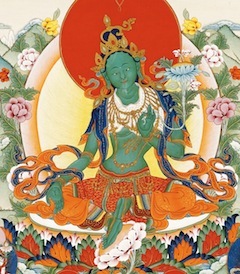Sevenfold Supplication
༄༅། །སྒྲོལ་མ་སྐྱབས་བདུན་མ་བཞུགས་སོ། །
Prayer to Tārā: A Sevenfold Supplication for Protection
by Drikung Kyobpa Jikten Sumgön
མ་སྐྱེ་བ་མེད་པའི་ཆོས་དབྱིངས་ན། །
ma kyewa mepé chöying na
I pray to celestial Tārā, the exalted mother,
ཡུམ་རྗེ་བཙུན་ལྷ་མོ་སྒྲོལ་མ་བཞུགས། །
yum jetsün lhamo drolma zhuk
Who abides within the uncreated dharmadhātu,
དེ་སེམས་ཅན་ཀུན་ལ་བདེ་སྟེར་མ། །
dé semchen kün la dé ter ma
From where she bestows comfort and joy upon all:
བདག་འཇིགས་པ་ཀུན་ལས་བསྐྱབ་ཏུ་གསོལ། །
dak jikpa kün lé kyab tu sol
Protect me from all fear.
རང་ཆོས་སྐུ་ཡིན་པར་མ་ཤེས་པར། །
rang chöku yinpar ma shepar
I pray to the divine mother Tārā:
སེམས་ཉོན་མོངས་དབང་དུ་གྱུར་པ་ཡི། །
sem nyönmong wang du gyurpa yi
Through not realizing our innate nature to be dharmakāya,
མ་འཁོར་བར་འཁྱམས་པའི་སེམས་ཅན་ལ། །
ma khorwar khyampé semchen la
Our minds remain under the influence of destructive emotion;
ཡུམ་ལྷ་མོ་ཁྱོད་ཀྱིས་བསྐྱབ་ཏུ་གསོལ། །
yum lhamo khyö kyi kyab tu sol
Protect all of us who wander aimlessly in saṃsāra.
ཆོས་སྙིང་ནས་རྒྱུད་ལ་མ་སྐྱེས་པར། །
chö nying né gyü la ma kyepar
I pray to the genuine deity, mother Tārā:
ཐ་སྙད་ཚིག་གི་རྗེས་འབྲངས་ནས། །
tanyé tsik gi jé drang né
Protect us in whose hearts the genuine dharma hasn’t been born,
གྲུབ་མཐའ་ངན་པས་བསླུས་པ་ལ། །
drubta ngenpé lüpa la
Who fixate on words and ideas,
ཡུམ་ཡང་དག་གི་ལྷ་མོས་བསྐྱབ་ཏུ་གསོལ། །
yum yangdak gi lhamö kyab tu sol
Or who have been deceived by false claims.
རྟོགས་པར་དཀའ་བ་རང་གི་སེམས། །
tokpar kawa rang gi sem
I pray to the deity of mindfulness, mother Tārā:
མཐོང་ནས་གོམས་པར་མི་བྱེད་པར། །
tong né gompar mi jepar
Protect us who have glimpsed the nature of mind, so difficult to realize,
བྱ་བ་ངན་པས་གཡེང་བ་ལ། །
jawa ngenpé yengwa la
And yet, due to lack of mindfulness and familiarity,
ཡུམ་དྲན་པའི་ལྷ་མོས་བསྐྱབ་ཏུ་གསོལ། །
yum drenpé lhamö kyab tu sol
Remain distracted by negative action.
སེམས་རང་བྱུང་གཉིས་མེད་ཡེ་ཤེས་ལ། །
sem rangjung nyimé yeshe la
I pray to the deity who is inseparable from my mind, mother Tārā:
གཉིས་སུ་འཛིན་པའི་བག་ཆགས་ཀྱིས། །
nyisu dzinpé bakchak kyi
Protect us whose strong adherence to and grasping at subject-object duality
ཇི་ལྟར་བྱས་ཀྱང་བཅིངས་པ་རྣམས། །
jitar jé kyang chingpa nam
Blinds us from realizing
ཐུགས་གཉིས་མེད་ཀྱི་ལྷ་མོས་བསྐྱབ་ཏུ་གསོལ། །
tuk nyimé kyi lhamö kyab tu sol
The true nature of mind, non-dual wisdom.
ཡང་དག་གི་དོན་ལ་གནས་བྱས་ཀྱང་། །
yangdak gi dön la né jé kyang
I pray to the deity of omniscience, mother Tārā:
རྒྱུ་འབྲས་ཀྱི་རྟེན་འབྲེལ་མི་ཤེས་པས། །
gyundré kyi tendrel mishepé
Protect us who, even though we abide in the midst of reality
ཤེས་བྱའི་དོན་ལ་རྨོངས་པ་ལ། །
shejé dön la mongpa la
Fail to recognise cause and effect and mutual dependence
ཡུམ་ཀུན་མཁྱེན་གྱི་ལྷ་མོས་བསྐྱབ་ཏུ་གསོལ། །
yum künkhyen gyi lhamö kyab tu sol
And thus remain in confusion.
སྤྲོས་བྲལ་ནམ་མཁའི་མཚན་ཉིད་ཅན། །
trödral namkhé tsennyi chen
I pray to the fully awakened deity, mother Tārā:
ཐམས་ཅད་དེ་དང་དབྱེར་མེད་ཀྱིས། །
tamché dé dang yermé kyi
Protect us who still remain unaware of the inseparability
ད་དུང་སློབ་མའི་གང་ཟག་ལ། །
dadung lobmé gangzak la
Of the unelaborate, sky-like nature,
ཡུམ་རྫོགས་སངས་རྒྱས་ཀྱིས་བསྐྱབ་ཏུ་གསོལ། །
yum dzok sangyé kyi kyab tu sol
And everything it pervades.
ཅེས་པ་ཨེ་ཆུང་ཕུག་ཏུ་རྗེ་འཇིག་རྟེན་མགོན་པོས་འཕགས་མ་སྒྲོལ་མ་བདུན་ཞལ་གཟིགས་དུས་གསོལ་བ་བཏབ་པ་སྐྱབས་བདུན་མར་གྲགས་པ་བྱིན་བརླབས་ཤིན་ཏུ་ཆེ་བར་གྲགས་སོ། །
Whilst residing at the Echung Cave, the great master Jikten Gönpo beheld the faces of seven forms of Tārā. He supplicated them with these seven verses, renowned as A Prayer to Tārā: A Sevenfold Supplication for Protection, which carry great blessing.
| Translated by Sean Price, 2020
Source:
skyob pa ʼjig rten gsum mgon. “sgrol bstod skyabs bdun ma.” In bKaʼ brgyud paʼi zhal ʼdon phyogs bsgrigs, Par gzhi dang po, Lhasa: Bod ljongs mi dmangs dpe skrun khang, 1997, pp. 143–144
Version: 1.2-20230206
